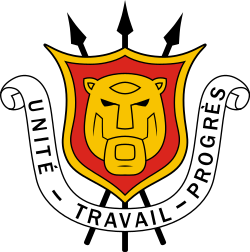| Country | Formal Relations Began. | Notes |
|---|
 Algeria Algeria | April 1972 | Both countries established diplomatic relations in April 1972 [44] - Algeria is represented in Burundi through its embassy in Bujumbura. [127]
- Burundi has an embassy in Algiers
|
 Angola Angola | 21 December 1988 | Both countries established diplomatic relations on 21 December 1988 when Angola's first Ambassador to Burundi, Miguel Gaspar Neto presented his credentials. [128] - Angola is represented in Burundi through its embassy in Tanzania. [127]
|
 Cameroon Cameroon | 1 August 1980 | Both countries established diplomatic relations on 1 August 1980 [67] |
 Central African Republic Central African Republic | | The two countries maintain diplomatic relations and Burundian President Pierre Nkurunziza visited the country in 2014. [130] |
 Democratic Republic of the Congo Democratic Republic of the Congo | 1963 | Both countries established diplomatic relations in 1963 [14] - Burundi has an embassy in Kinshasa. [131]
- DR Congo has an embassy in Bujumbura.
|
 Republic of Congo Republic of Congo | 21 December 1980 | Both countries established diplomatic relations on 21 December 1980 [69] - Congo is represented in Burundi through its embassy in Rwanda. [127]
|
 Egypt Egypt | 8 December 1964 | Both countries established diplomatic relations on 8 December 1964 [18] |
 Equatorial Guinea Equatorial Guinea | | - Burundi is represented in Equatorial Guinea through its embassy in Nigeria. [132]
- Equatorial Guinea is represented in Burundi through its embassy in the Republic of Congo. [132]
|
 Ethiopia Ethiopia | 9 June 1965 | Both countries established diplomatic relations on 9 June 1965 when the Burundi government has appointed its Ambassador in Addis Ababa, Pascar Bugiriza [21] - Burundi has an embassy in Addis Ababa. [131]
- The two countries maintain friendly and cooperative relations. [133]
|
 Ghana Ghana | 25 August 1964 | Both countries established diplomatic relations on 25 August 1964 [16] - Ghana is represented in Burundi through its embassy in Kenya. [134]
|
 Guinea Guinea | 28 June 1967 | Both countries established diplomatic relations on 28 June 1967 [29] - Guinea is represented in Burundi through its embassy in Gabon. [135]
|
 Kenya Kenya | 1967 | See Kenya–Burundi relations |
 Malawi Malawi | | - Malawi is represented in Burundi through its embassy in Tanzania. [127]
|
 Morocco Morocco | 13 September 1991 | Both countries established diplomatic relations on 13 September 1991 [79] |
 Mozambique Mozambique | 26 June 1975 | - Mozambique is represented in Burundi through its embassy in Tanzania. [127]
|
 Nigeria Nigeria | 6 November 1970 | Both countries established diplomatic relations on 6 November 1970 when M. Jimm Etuk, first Ambassador of Nigeria to Burundi, presented his letters of credentials to colonel Michel Micombero, Head of State. [41] |
 Rwanda Rwanda | April 1969 | Both countries established diplomatic relations in April 1969 [39] - Rwanda has an embassy in Bujumbura.
|
 Senegal Senegal | January 1969 | Both countries established diplomatic relations in January 1969 [37] - Senegal is represented in Burundi through its embassy in Ethiopia. [127]
|
 Sierra Leone Sierra Leone | 2 March 2016 | Both countries established diplomatic relations on 2 March 2016. [105] - Sierra Leone is represented in Burundi through its embassy in Ethiopia. [127]
|
 Somalia Somalia | 1970 | |
 South Africa South Africa | 23 June 1995 | |
 South Sudan South Sudan | 28 November 2012 | Both countries established diplomatic relations on 28 November 2012 [100] - South Sudan is represented in Burundi through its embassy in Uganda. [127]
|
 Sudan Sudan | 1970 | Both countries established diplomatic relations in 1970 [43] - Sudan is represented in Burundi through its embassy in Uganda. [127]
|
 Tanzania Tanzania | 9 September 1965 | See Burundi–Tanzania relations - Burundi has an embassy in Dar es Salaam.
- Tanzania has an embassy in Bujumbura.
|
 Uganda Uganda | 25 August 1967 | Both countries established diplomatic relations on 25 August 1967 when has been accredited Ambassador of Burundi to Uganda (Resident in Dar es Salaam) Mr. P. Mangona. [30] |
 Zambia Zambia | 13 March 1973 | Both countries established diplomatic relations on 13 March 1973 [48] |


